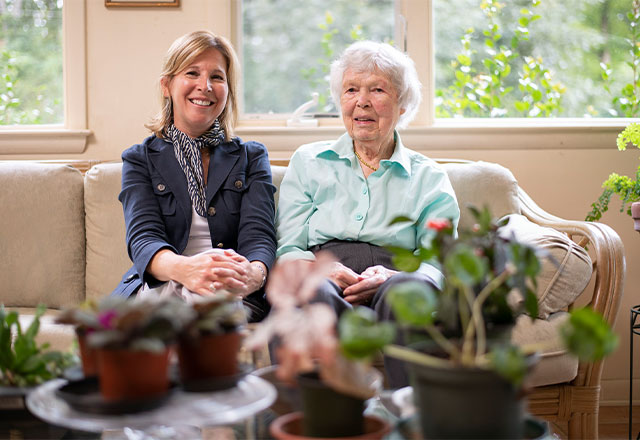An Avid Gardener's Gift for Growth
Through a unique patient-centric rehabilitation program, friendships are sometimes formed that go beyond the realm of clinical care and reveal the underlying humanity at work.

Judith Goldstein and Barbara Simerl in 2019
When Judith Goldstein, O.D., was first introduced to Barbara Simerl in 2015 by Simerl’s dear friend of 50 years, Carol Melchner, Goldstein could not have imagined the friendship that lay in their future. That is to say, until they began to get to know each other.
“She was a joy to be around,” says Goldstein in describing her friend, a remarkable octogenarian who was witty, active, well-informed and enormously fun.
“Nothing fazed Barbara, even macular degeneration,” recalls Melchner. “I think it was the secret to her good health and longevity.”
Simerl was an avid gardener and passionate cook who sailed, fished, wove her own fabrics and served tea every day at 4 p.m. to any friend who happened to drop by. That’s the kind of woman she was. That’s why it came as such a jolt when Goldstein learned of the passing of her friend on June 26, 2022, at age 102.
Goldstein experienced a second shock when she later learned of the extraordinary and generous gift Simerl had bequeathed to support the ongoing work of the Wilmer Eye Institute’s Lions Vision Research and Rehabilitation Center.
“Gifts like this to the Wilmer Institute have provided the seed funds to allow our scientists to pursue their best ideas and gather the preliminary data necessary to obtain grant funding from the National Institutes of Health and other agencies that support research,” says Wilmer Director Peter J. McDonnell, M.D., the William Holland Wilmer Professor of Ophthalmology.
The vision care that Goldstein provides at the Lions Vision Research and Rehabilitation Center is highly specialized care. As a physician and director of the center, Goldstein spends nearly an hour, face to face, with every patient as part of this unique, patient-centric rehabilitative program. In such a personalized setting, friendships are sometimes formed that go beyond the realm of clinical care and reveal the underlying humanity at work.
That was certainly the case with Barbara Simerl. Goldstein notes that Simerl’s can-do attitude made her a natural fit for the low vision service, which relies in many ways on patients’ willingness to adapt and learn. “Even at 100, she was determined to learn new skills,” says Goldstein.
One of the low vision program’s strengths, Goldstein notes, is its team approach to patient care. “Barbara would see me for an evaluation and then our occupational therapist, Kristen Shifflett, would dive into the practicalities. She might take the tools I was recommending and have Barbara simulate sewing or knitting or reading her beloved New York Times.”
Goldstein says she is honored to have known Simerl and beyond grateful for a gift that she sees as an act of faith in the unlimited possibilities opening up for low vision patients, thanks to rapid advances in technology.
“Barbara’s transformational gift will enable us to recruit young clinician-scientists and researchers dedicated to the field and to further the work of identifying and developing new treatment strategies to improve our patients’ lives,” says Goldstein.
